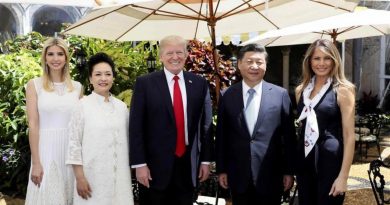Trump’s UN Address On Global Security
By Anthony Tokarz
Staff Writer
President Donald Trump’s address before the United Nations General Assembly on September 19 attracted widespread scrutiny and criticism. Many critics equated his emphasizing the privileges of sovereignty, a hallmark of his “America First” doctrine, with undermining U.N. principles and U.S. moral leadership. Furthermore, the criticisms levied at Trump seem to suggest
that he had gone against the conventions of the UN. A more circumspect and accurate analysis, however, finds that Trump advocated a careful give-and-take relationship between sovereignty and public responsibility on the part of leaders.
His thanks to other leaders for their support in the wake of hurricanes Harvey and Irma, followed by pronouncements of American strength and resilience, felt rote and perfunctory. He even resuscitated the common trope of finding the world at a crossroads, a cliché as old as the UN itself.
From a structural perspective, then, Trump’s address raised few eyebrows. He differed most from his predecessor in extolling the post-WWII era as the golden age of international relations, and further in examining this through the lens of the Marshall Plan. He remarked, early on, that the pillars of successful international dialogue are “peace, sovereignty, security, and prosperity” before stating, “The Marshall Plan was built on the noble idea that the whole world is safer when nations are strong, independent, and free.” Trump did well to reintroduce sovereignty as the fundamental concept of international relations. His favoritism of the Marshall Plan taps a political tradition dating all the way to the 1648 Peace of Westphalia, which gave governments more autonomy but also greater responsibility in balancing each other’s power and preventing domination by any one of them. Trade and politics became the primary tools of this. Today, however, the United States dominates both global trade and politics through a network of international institutions, especially those conceived of at the Bretton Woods Conference and ensure the preeminence of U.S. values and the dollar. This fact of American hegemony suggests a contradiction on the premiseof “America First,” the fantasy that American greatness can persist without support for then institutions that created it.
The U.S. should hesitate to interpret sovereignty as the right to renege on agreements with other nations and renegotiate trust with its allies; this would constitute an abuse of sovereignty by ignoring the need to improve the condition of the American people. More than anything else, however, Trump attracted a lot of backlash for the following statement: “As president of the United States, I will always put America first. Just like you, as the leaders of your countries, will always and should always put your countries first.” This refers back to his celebration of “We the People” as the fundamental principle of the U.S. Constitution. He encourages leaders to undertake policies for the betterment of their people, in the belief that the enrichment of the people will free the political elites of those nations from groupthink.
If the leaders make themselves accountable to their people, they will have to undertake stronger and more long-term policies. The responsibility of accountability to citizens must balance the rights of sovereignty, in Trump’s formulation. In this matter, the notorious subject of Kim Jong Un’s North Korea rears its head, where it should. Trump’s address cites a litany of North Korean transgressions against its own people as well as against rival states. At the root of this series of complaints lay the observation that relationships cannot exist without restraint; this is
especially true of international relations. Trump’s insistence on North Korea’s denuclearization is actually a demand for proof that North Korea can show restraint. No nation benefits from North Korea’s isolation, except maybe China. It would be better for North Korea to share in the work of maintaining global order as a partner rather than keeping a tight grip on internal order as a tyrannical government. The U.S.,in its vaunted capacity as the moral leader of its allies, must have the courage to push nations, allied and otherwise, to change some aspect of their governing style to fall into line with other states, i.e. potential allies, just as an individual shows love by daring to identify and correct his friend’s bad behavior.
North Korea has played up its bad behavior by antagonizing regional neighbors with aggressive missile launches and weapons development programs. The U.S. must continue to oppose this lest other nations accept it as normal.
Trump likewise holds himself to a high leadership standard rooted in providing social benefit to U.S. citizens. He makes the proud assertion that “in America, the people govern, the people rule, and the people are sovereign. I was elected not to take power, but to give power to the American people where it belongs.” This begins, in his mind, with the claims in this speech, which he hoped would reorient global security priorities. Although Trump’s reactionary justification of “America First” appeals to sovereignty, he is right to point out the dangers facing nations today, not least a nuclear North Korea chief. UN member states could do well to temper their (often anti-Trump) ideals with the cold calculation necessary to ensure full participation in global events based on autonomy and the social good.

